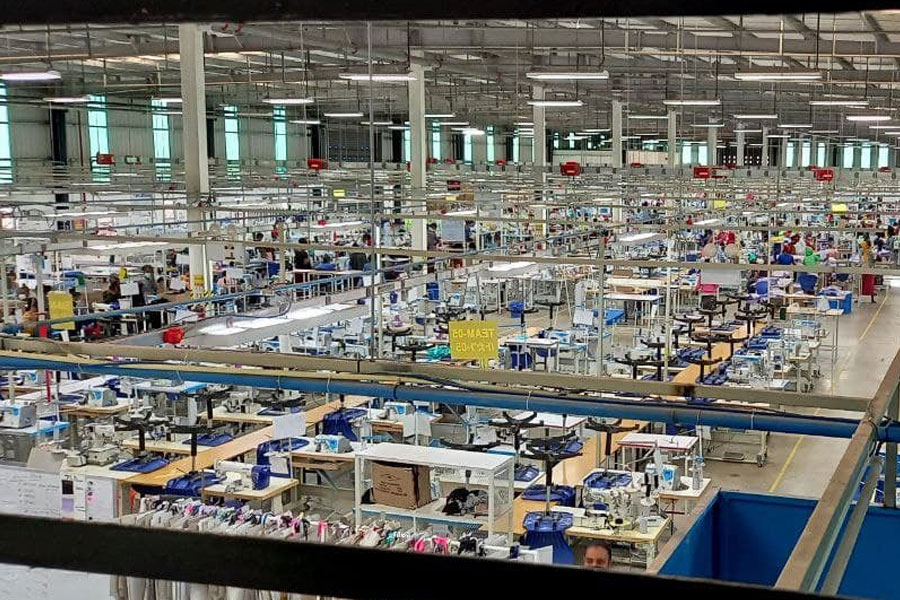
Radar | Jan 31,2021
Sep 24 , 2022
By Catherine McKenna
Walking down a Toronto street recently I saw an ad touting a fossil-fuel company’s net-zero credentials. But to see such belief-straining claims, I would not even need to leave my house.
According to a study by the Guardian and InfluenceMap, such ads are all over Google. Ads for oil giant Shell, for example, appeared on 86pc of searches for “net zero,” with many promoting the company’s pledge to reach net-zero emissions by 2050.
Are corporations finally waking up to the urgency of the climate crisis, or is this just more greenwashing?
One thing is certain: the climate crisis is escalating fast. California is enduring record-breaking heat waves. A third of Pakistan is underwater. China is suffering a withering drought, which may have global ramifications. And that is just what is happening right now. From cold snaps in Texas to wildfires in Europe, climate change has become impossible to ignore.
Climate action has come a long way since the Paris climate agreement was signed in 2015. Notably, net zero has gone mainstream, with some 90pc of global GDP now covered by net-zero targets. And it is not just governments that have adopted them; many of the world’s biggest companies have done so, too, motivated by a combination of business interest, investor expectations, and consumer pressure.
But if corporations – including fossil-fuel companies – are now “climate leaders,” fully and loudly committed to the net-zero cause, why are emissions still rising? A look at the history of climate action reveals the answer.
Over the last 20 years, a diverse array of climate initiatives has sought to persuade businesses and investors to accept the idea of setting climate-related targets, cutting emissions, and then setting even more ambitious targets. These initiatives have had one thing in common: all have been voluntary.
As anyone who has ever broken a New Year’s resolution knows firsthand, a promise made is not always a promise kept. If someone says they will achieve net zero, how can we be sure that they are taking the steps needed to deliver? Right now, we cannot.
This has enabled “climate coasting,” with companies marketing themselves as environmentally conscious while continuing with business as usual, or close to it. As it stands, only one in three corporate net-zero plans cover the company’s full carbon footprint, including that of its supply chain. And not one of the world’s biggest corporate polluters has fully explained how it plans to achieve net-zero emissions.
As United Nations Secretary-General António Guterres recently said, “The world is in a race against time, and we cannot afford slow movers, fake movers, or any form of greenwashing.”
These are the problems the High-Level Expert Group on Net-Zero Emissions Commitments, which I chair, is meant to solve. We are an independent, diverse group of experts determined to provide science-based recommendations for achieving the goal so many governments and companies have embraced.
Our work is just beginning, but three things are already clear. First, a pledge without a plan is meaningless. Companies must align their business strategies with their commitments, take ambitious action, and start delivering progress immediately. And this does not mean fudging the numbers with questionable offsets; the only credible way to achieve net zero is to slash emissions.
To support this effort, the High-Level Expert Group will define what it will take to achieve net-zero emissions. This includes establishing clear criteria for credible net-zero plans that account for issues of equity and climate justice. Regional and sectoral standard-setters can then adapt our criteria, thereby ensuring consistency and comparability.
Second, voluntary schemes are not enough. We do not need New Year’s resolutions; we need new business plans. Regulation will be essential here, both to ensure that voluntary climate roadmaps are replaced by mandatory strategies and to level the playing field. A central objective of the High-Level Expert Group is to map the needed regulations.
Finally, accountability is essential. When companies, banks, investors, cities, and regions make net-zero commitments, we must be able to trust them. Fair rules of engagement will help. But governments, corporations, and financiers must also embrace radical transparency. Progress will be easy to spot: investment in clean energy will supersede investment in fossil fuels, and emissions will fall.
Already, our expert group has engaged more than 800 groups, met with thousands of people, and received almost 300 submissions detailing how net-zero commitments can be improved – a clear indication of how keen stakeholders are to get this right. Success would not only give us a shot at stabilising the climate; it would bring vast economic opportunities. According to McKinsey, growing demand for net-zero offerings could generate more than 12 trillion dollars in sales annually by 2030.
Last year, I left politics to dedicate my time to the two things that mattered most to me: my kids and climate change. The two priorities are deeply interconnected. If we are to avoid a future where our children are buying “net-zero” bacon between floods and fires, we must close the gap between the promises we hear and the action we need.
PUBLISHED ON
Sep 24,2022 [ VOL
23 , NO
1169]


Radar | Jan 31,2021

Radar | Apr 30,2021

Radar | Jun 22,2019

Viewpoints | Sep 19,2020

Fortune News | Jul 02,2022

Radar | Jun 18,2022

Radar | Mar 30,2019

Fortune News | May 16,2020

Fortune News | Oct 15,2022

Commentaries | Mar 16,2024

My Opinion | 132105 Views | Aug 14,2021

My Opinion | 128507 Views | Aug 21,2021

My Opinion | 126435 Views | Sep 10,2021

My Opinion | 124046 Views | Aug 07,2021





Dec 22 , 2024 . By TIZITA SHEWAFERAW
Charged with transforming colossal state-owned enterprises into modern and competitiv...

Aug 18 , 2024 . By AKSAH ITALO
Although predictable Yonas Zerihun's job in the ride-hailing service is not immune to...

Jul 28 , 2024 . By TIZITA SHEWAFERAW
Unhabitual, perhaps too many, Samuel Gebreyohannes, 38, used to occasionally enjoy a couple of beers at breakfast. However, he recently swit...

Jul 13 , 2024 . By AKSAH ITALO
Investors who rely on tractors, trucks, and field vehicles for commuting, transporting commodities, and f...

Jul 12 , 2025
Political leaders and their policy advisors often promise great leaps forward, yet th...

Jul 5 , 2025
Six years ago, Ethiopia was the darling of international liberal commentators. A year...

Jun 28 , 2025
Meseret Damtie, the assertive auditor general, has never been shy about naming names...

Jun 21 , 2025
A well-worn adage says, “Budget is not destiny, but it is direction.” Examining t...

Jul 13 , 2025 . By YITBAREK GETACHEW
The Addis Abeba City Revenue Bureau has introduced a new directive set to reshape how...

Jul 13 , 2025 . By BEZAWIT HULUAGER
Addis Abeba has approved a record 350 billion Br budget for the 2025/26 fiscal year,...

Jul 13 , 2025 . By RUTH BERHANU
The Addis Abeba Revenue Bureau has scrapped a value-added tax (VAT) on unprocessed ve...

Jul 13 , 2025 . By NAHOM AYELE
Federal lawmakers have finally brought closure to a protracted and contentious tax de...